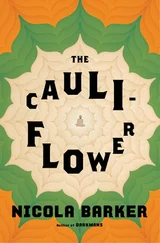Nicola Barker - The Yips
Здесь есть возможность читать онлайн «Nicola Barker - The Yips» — ознакомительный отрывок электронной книги совершенно бесплатно, а после прочтения отрывка купить полную версию. В некоторых случаях можно слушать аудио, скачать через торрент в формате fb2 и присутствует краткое содержание. Год выпуска: 2012, Издательство: Fourth Estate, Жанр: Современная проза, на английском языке. Описание произведения, (предисловие) а так же отзывы посетителей доступны на портале библиотеки ЛибКат.
- Название:The Yips
- Автор:
- Издательство:Fourth Estate
- Жанр:
- Год:2012
- ISBN:нет данных
- Рейтинг книги:4 / 5. Голосов: 1
-
Избранное:Добавить в избранное
- Отзывы:
-
Ваша оценка:
- 80
- 1
- 2
- 3
- 4
- 5
The Yips: краткое содержание, описание и аннотация
Предлагаем к чтению аннотацию, описание, краткое содержание или предисловие (зависит от того, что написал сам автор книги «The Yips»). Если вы не нашли необходимую информацию о книге — напишите в комментариях, мы постараемся отыскать её.
The Yips — читать онлайн ознакомительный отрывок
Ниже представлен текст книги, разбитый по страницам. Система сохранения места последней прочитанной страницы, позволяет с удобством читать онлайн бесплатно книгу «The Yips», без необходимости каждый раз заново искать на чём Вы остановились. Поставьте закладку, и сможете в любой момент перейти на страницу, на которой закончили чтение.
Интервал:
Закладка:
‘I should’ve done this years ago,’ she mutters, heading for the back door.
‘What are you doing?’ her mother demands, grinding to a halt, shocked.
‘I’m getting rid of them.’ Valentine removes the key from the lock, wrenches the door open, steps outside, slams it shut again, drops the box and locks it before her mother can elbow her way through.
‘You can’t go out there!’ Her mother presses herself up against the window, outraged.
Valentine grabs the box and charges down the garden. There is a small, slightly rusty portable waste incinerator standing close to the shed. She places the box next to it and goes into the shed to find charcoal, an old lighter, some kindling and a can of petrol, then returns outside clutching them.
Her mother is banging against the back door and yelling.
‘All will be well,’ Valentine murmurs, her hands shaking, uncontrollably, ‘all will be well.’
She carefully places the charcoal, the kindling, the boxed and un-boxed rings — not forgetting the purse and the whip — inside the incinerator, then douses them with petrol. She tears the box itself into workable segments, presses it down on top, adds more petrol and then replaces the lid. She steps back, appraising her work, the lighter in her hand. She tries to draw a deep breath but can’t inhale.
‘All will be well,’ she murmurs, striking the lighter, kneeling down and holding it to one of several holes cut into the lower section of the metal bin. The flame flares, touches the kindling, then instantly goes out. She strikes it a second time, then a third. The fourth time the kindling takes. No sooner has she started to celebrate its finally catching than she’s toppling back, alarmed, as the entire incinerator is engulfed in flames. A huge tongue of fire snakes from the metal chimney in its lid, reaching several feet into the air and setting light to the lower branches of an ash tree that hangs into the garden over the fence from next door.
‘Oh God!’ Valentine scrambles a few feet away then rises to her knees, her hands covering her mouth. When the sight gets too distressing she closes her eyes. She feels the heat on her face. She feels the hard ground pressing into her shins.
‘All will be well,’ she tells herself, then sinks back on to her heels, her fingers splayed into the grass. She feels it under her fingers. She starts to delineate individual strands. She opens her eyes and gazes at it, bringing her veiled face forward, drawing closer — inch by gradual inch — to the ground. Soon her nose is pressed into it, her forehead. She is completely bent over, suppliant, bowed down.
‘Take me,’ she murmurs, hearing the whoosh and crackle of the flames through her veil, hearing the individual leaves sizzle, the metal knock, the creak of wood — every sound so neatly contained, so strictly partitioned, so singular, and yet so thoroughly consumed and subsumed by the fire’s hungry roar.
She feels a sense of quietness deep within herself, of space, of peace. I am a void, she thinks. I am done. I am beyond care — beyond fear.
How long does she lie there? She cannot tell. But when she finally lifts her head the flames have gone; the metal bin no longer belches fire, only smoke. The fence is singed, and part of the shed’s grey roof. The air around her plays host to a thousand tiny black flakes of dark confetti — originating from some mysterious source — which float downwards then seem to evaporate, like tokens in celebration not of an earthly union, but of a curious un doing — a gradual unravelling — which is at once the start of something and the glorious beginning of another ending.
Valentine stands up and walks, mechanically — almost zombie-like — to the back door. She turns the key in the lock and twists the handle. The door stays shut. The bolt has been shot. She barely reacts, just walks over to a nearby rockery, picks up a half-brick, carries it back with her and smashes the window with it. She does a thorough job: knocking out any sharp or jagged fragments, dropping the brick, then shoving her arm through the gap and un-shooting the bolt.
Inside the kitchen all is chaos. Her mother has tipped over the dresser and turned the table on to its side. Enamelware lies chipped and dented in every corner. The kitchen cabinets have been kicked and gouged and scratched. Even the curtains have been ripped down from the window.
Valentine walks through the chaos, into the hallway and pauses, briefly, in the doorway to her studio. This room has also been trashed — perhaps a fraction less thoroughly — her inks cabinet has been pulled open but only a half-dozen bottles smashed. Towels cover the floor. The taps are on (Valentine goes to turn them off). The printer lies in pieces, although the computer gives every appearance of still being functional.
A phone starts to ring. Valentine turns and is drawn — trance-like — towards its sound. On her way to answering it she passes by the sitting room where she espies her mother, face-down on the sofa, arms and legs thrown out, replete; exhausted. On the floor around her lie several photos from Valentine’s portfolio (ripped in half) and her shrine, upended, the photo of Kali crushed into a ball, the string of Japa Mala beads snapped and the beads themselves scattered.
She walks on, past the staircase where Nessa sits, halfway down, in her vest and pants, freshly awoken, red-cheeked, bemused, sucking on her half-filled baby beaker.
Valentine holds out her hand and the child bumps her way down to join her. The base of the stairs is covered in broken pot and soil. The aspidistra has been divided into two large chunks and lies, roots up, tangled with the wire of the black Bakelite phone. The ringing sound comes from Valentine’s mobile which lies half-hidden under a pile of compost. She picks it up, blows away the worst of the dirt, pulls off her niqab and answers.
‘Hello?’
Her cheeks are streaked with mascara. She listens for a second, frowning.
‘It is me — it’s Valentine.’
She looks confused.
‘Sorry … When?’
She shakes her head, then glances down at the child (now clinging on to her leg) and distractedly tousles her hair.
‘Fine. But I’ll need someone to look after Mum and Nessa. Noel’s not around.’
Brief pause.
‘You’ll drive me?’
Vague look of hope.
‘Okay …’ She nods, then frowns, then looks confused again. ‘Thanks.’
She hangs up, sighs, and slowly walks back to the kitchen where she gently places Nessa on to the rocking chair, grabs a nearby cat and plops it on to her lap.
‘Stroke him,’ she says. ‘Love him. Make him feel happy again.’
She then ties back her hair, turns on the tap, leans forward and scrubs her face in the sink — violently, fastidiously — for several minutes, dries it on a tea towel, pulls on her apron and starts cleaning up the mess.
* * *
‘What did she say?’ Toby walks up beside him. ‘Will she do it?’
‘Yeah’ — Gene nods, his cheeks slightly flushed — ‘but she needs someone to baby-sit her mother and her niece.’
‘Got anyone in mind?’
Gene blinks a couple of times. He seems to be finding it difficult to focus.
‘What about the brother?’
‘Uh … He’s not very reliable.’
‘How about — you know?’
Toby tips his head towards Jen who currently sits, alongside Israel, in the back of the Hummer waiting for a lift back into town.
Gene grimaces. ‘I’m not sure if that’s such a good idea.’
‘What isn’t?’
Jen pops her head through the open door on the passenger side.
‘Are you rostered on at work tonight?’ Gene asks, hoping to avoid the issue.
‘Why?’ Jen demands.
Читать дальшеИнтервал:
Закладка:
Похожие книги на «The Yips»
Представляем Вашему вниманию похожие книги на «The Yips» списком для выбора. Мы отобрали схожую по названию и смыслу литературу в надежде предоставить читателям больше вариантов отыскать новые, интересные, ещё непрочитанные произведения.
Обсуждение, отзывы о книге «The Yips» и просто собственные мнения читателей. Оставьте ваши комментарии, напишите, что Вы думаете о произведении, его смысле или главных героях. Укажите что конкретно понравилось, а что нет, и почему Вы так считаете.












